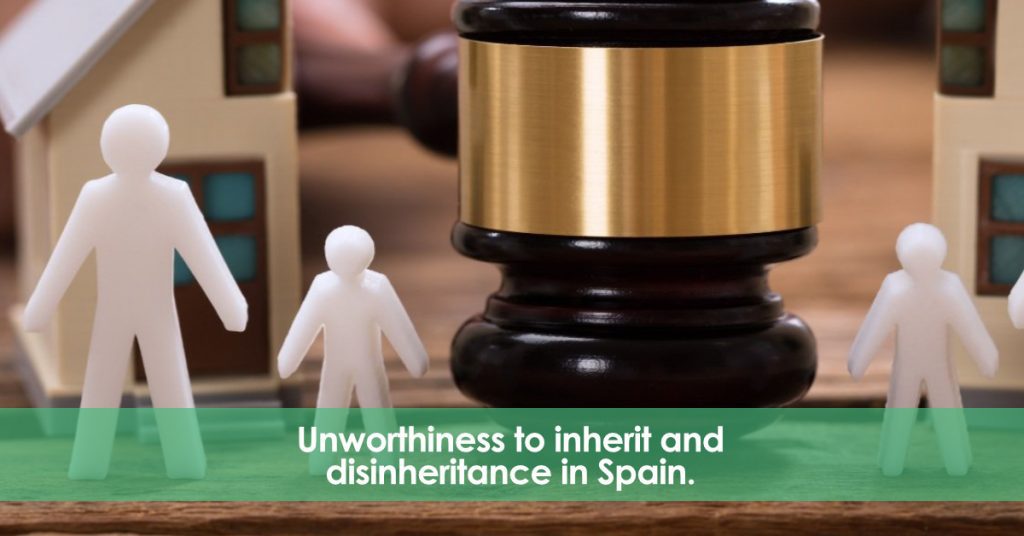In Spain, the law reserves a large part of the estate of the deceased to certain family members such as children, parents, etc. This is what is known as the “legitimate rights”. In today’s article we analyse two concepts that often cause confusion. Unworthiness to inherit and disinheritance. We review the causes and main differences of each of these legal concepts.
Disinheritance in Spain. Regulation.
The disinheritance is regulated in Article 848 et seq. of the Civil Code. The Spanish system provides for specific causes for ascendants, descendants, spouses, etc. In brief, the main causes of disinheritance are as follows:
– Having been convicted of attempting against the life of the testator, his/her spouse or partner, or his/her ascendants or descendants.
– Denying maintenance to the testator, when the latter is his/her ascendant or descendant. – Slanderously accusing the testator of having committed a crime.
– In the case of ascendants, having lost parental authority over their children or descendants.
– Abandonment, prostitution or corruption of the children.
– Etc.
Disinheritance procedure. Will and burden of proof, etc.
Disinheritance is only possible in cases of testate succession. That is, when there is a will. Therefore, the first step to disinherit someone is to execute a will before a notary. The cause of disinheritance, its basis, etc. must be clearly and precisely stated in the will. Therefore, seeking expert legal advice to study your case in detail and to advise how to proceed according to your particular case, is essential.
If the heir that has been disinherited denies the cause of disinheritance being true, the burden of proof will fall on the rest of the heirs; that must prove that the disinheritance is valid and has been correctly founded. Providing evidence or documentation attesting to it, etc.
Unworthiness to inherit: what exactly does this consist of?.
The causes of unworthiness are set out in Art. 756 of the Civil Code. Briefly, we highlight the following:
– Threatening through violence or fraud so that the testator grants a will or modifies it.
– Preventing the testator from making a will or revoking a will previously made.
– Having been convicted by a final judgement for attempting against the life of the testator, or for exercising physical/psychic violence against him/her, his/her spouse, partner or ascendants/descendants.
– Accusing the testator of committing a crime punishable by a severe penalty, and being convicted for false denunciation, etc.
Main differences between unworthiness to inherit and disinheritance.
As can be seen, some causes of unworthiness and disinheritance are very similar. However, there are important differences between both legal figures:
1.- Unworthiness occurs both in testate and in intestate inheritances. In other words: when there is a will and when there isn’t:
2.- Whereas the events that trigger the disinheritance must be prior to the death of the testator; the causes that lead to unworthiness can occur after the death of the testator.
3.- Disinheritance only affects the forced heirs, whereas the causes of unworthiness affect any heir (whether they are forced heirs or not).
4.- Indignity must be decided by a judge, unlike disinheritance that is determined by the testator in his/her will, and it is only necessary to prove it before a judge if the disinherited heir denies it being true.
Conclusion.
Unworthiness to inherit and disinheritance are complex concepts, which deserve a detailed analysis depending on the case. At White Baos Lawyers we are experts in Inheritance Law, contesting wills and preparing and advising when granting a will. Do not hesitate to contact us. We will study your case and offer you expert legal advice on the subject.
The information provided in this article is not intended to be legal advice, but merely conveys information relating to legal issues.
Carlos Baos (Lawyer)
White & Baos.
Tel: +34 966 426 185
E-mail: info@white-baos.com
White & Baos 2024 – All Rights Reserved.
